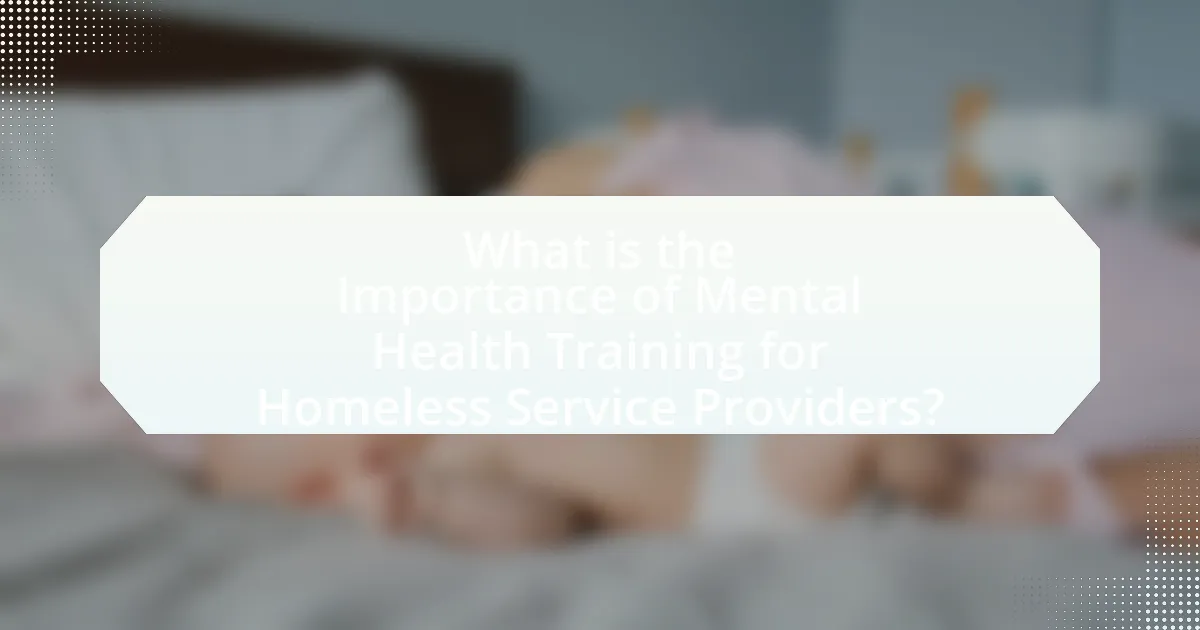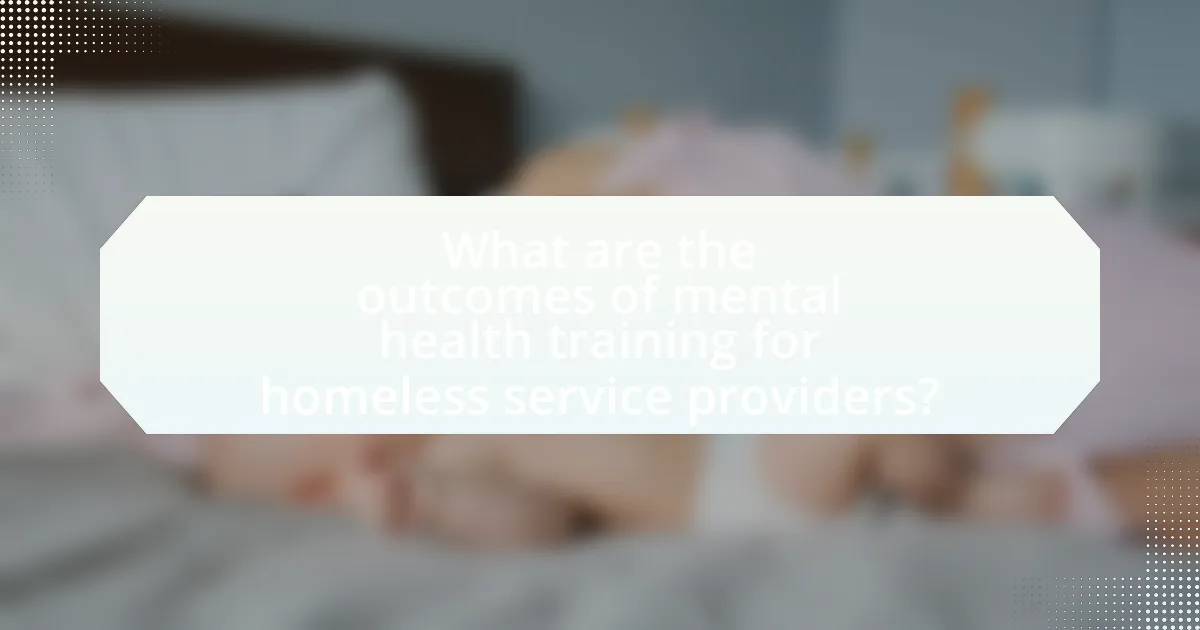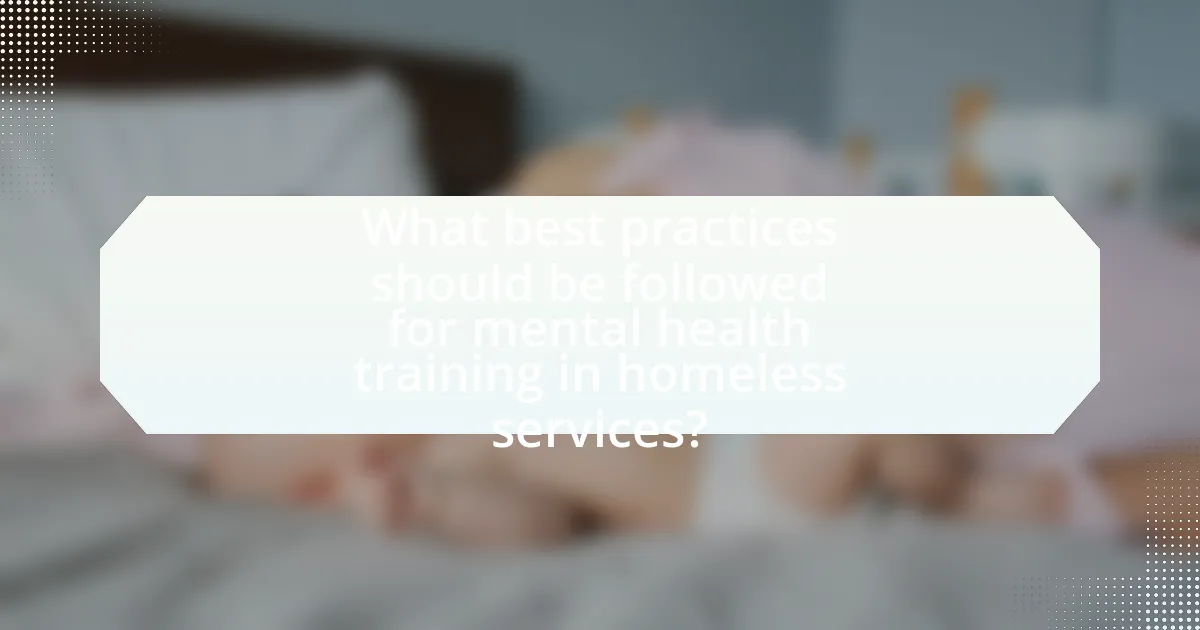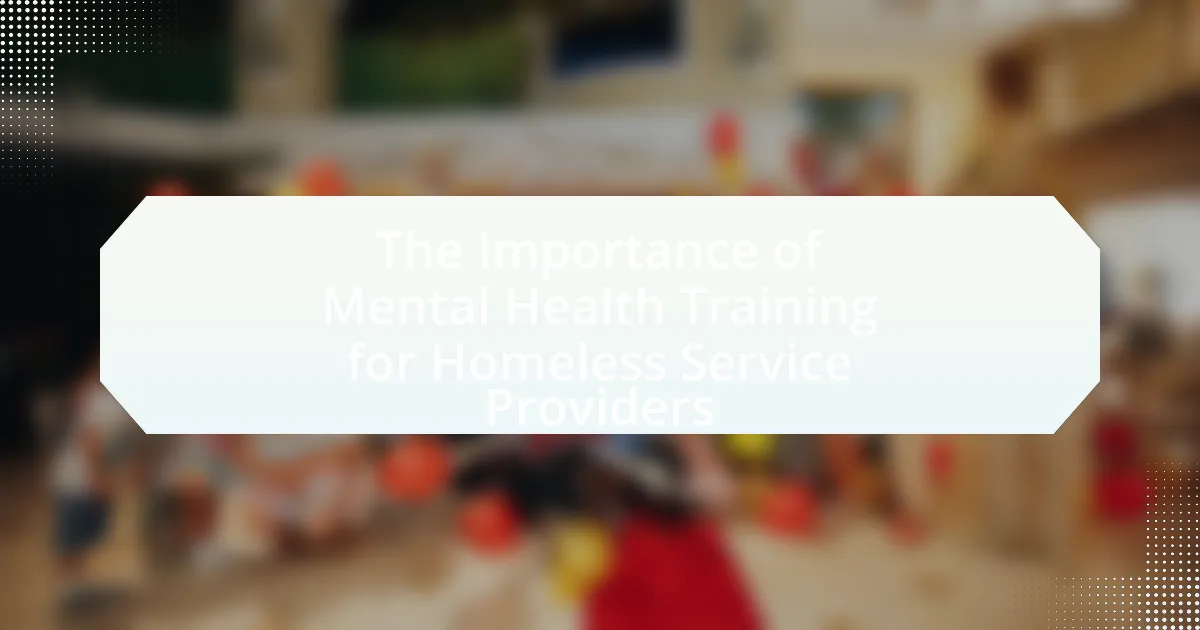Mental health training is essential for homeless service providers, as it equips them with the necessary skills to effectively support individuals facing mental health challenges. Approximately 30% of homeless individuals experience serious mental illness, making it crucial for service providers to recognize symptoms, understand trauma-informed care, and implement appropriate interventions. The article outlines the specific mental health challenges faced by homeless populations, the key components and topics of effective training programs, and the positive impact of such training on both service delivery and the well-being of clients. Additionally, it discusses the importance of ongoing support, cultural competency, and collaboration with mental health professionals to enhance training efforts and improve outcomes for homeless individuals.

What is the Importance of Mental Health Training for Homeless Service Providers?
Mental health training is crucial for homeless service providers as it equips them with the skills to effectively support individuals facing mental health challenges. This training enhances providers’ ability to recognize symptoms of mental illness, understand trauma-informed care, and implement appropriate interventions. Research indicates that approximately 30% of homeless individuals experience serious mental illness, highlighting the need for trained professionals who can address these specific needs. Furthermore, studies show that effective mental health training can lead to improved outcomes for clients, such as increased stability and reduced recidivism in homelessness. Thus, mental health training is essential for fostering a supportive environment that promotes recovery and well-being among homeless populations.
Why is mental health training essential for those working with the homeless population?
Mental health training is essential for those working with the homeless population because it equips service providers with the skills to recognize and address mental health issues effectively. Individuals experiencing homelessness often face high rates of mental health disorders, with studies indicating that approximately 30% of homeless individuals suffer from serious mental illness. This training enables providers to understand the complexities of mental health conditions, fostering empathy and improving communication with clients. Furthermore, trained professionals can implement appropriate interventions and connect individuals to necessary resources, ultimately enhancing the overall effectiveness of services offered to this vulnerable population.
What specific mental health challenges do homeless individuals face?
Homeless individuals face specific mental health challenges, including high rates of depression, anxiety, post-traumatic stress disorder (PTSD), and substance use disorders. Research indicates that approximately 25% of homeless individuals experience serious mental illness, significantly higher than the general population, which is around 5%. The stressors associated with homelessness, such as social isolation, trauma, and lack of access to healthcare, exacerbate these mental health issues. Furthermore, the National Coalition for the Homeless reports that many homeless individuals have experienced traumatic events, contributing to the prevalence of PTSD and other mental health disorders.
How can mental health training improve service delivery for homeless individuals?
Mental health training can significantly improve service delivery for homeless individuals by equipping service providers with the skills to recognize and address mental health issues effectively. This training enhances providers’ ability to create tailored support plans that consider the unique psychological needs of homeless individuals, leading to more effective interventions. Research indicates that trained staff can better engage with clients, resulting in increased trust and improved outcomes; for instance, a study published in the Journal of Social Work found that mental health training for service providers led to a 30% increase in client satisfaction and a 25% improvement in service utilization rates among homeless populations.
What are the key components of effective mental health training for service providers?
The key components of effective mental health training for service providers include comprehensive knowledge of mental health disorders, skills in crisis intervention, cultural competency, and ongoing support and supervision. Comprehensive knowledge equips service providers with an understanding of various mental health conditions, enabling them to identify symptoms and provide appropriate care. Skills in crisis intervention prepare providers to handle emergencies effectively, ensuring the safety of both clients and staff. Cultural competency fosters an understanding of diverse backgrounds, which is crucial for building trust and rapport with clients. Ongoing support and supervision ensure that service providers receive continuous education and guidance, which is essential for maintaining high standards of care and adapting to evolving mental health challenges.
What topics should be covered in mental health training programs?
Mental health training programs should cover topics such as mental health disorders, trauma-informed care, crisis intervention strategies, and effective communication skills. These subjects are essential for equipping service providers with the knowledge and skills necessary to support individuals experiencing mental health challenges, particularly in the context of homelessness. Research indicates that training in trauma-informed care can significantly improve service delivery and client outcomes, as it emphasizes understanding the impact of trauma on behavior and mental health. Additionally, knowledge of crisis intervention techniques is crucial, as it prepares providers to respond effectively to emergencies, thereby enhancing safety for both clients and staff.
How can training be tailored to meet the needs of homeless service providers?
Training can be tailored to meet the needs of homeless service providers by focusing on specific skills related to mental health, trauma-informed care, and cultural competency. This approach ensures that providers are equipped to address the unique challenges faced by homeless individuals, including high rates of mental illness and substance abuse. For instance, incorporating evidence-based practices such as Motivational Interviewing and Cognitive Behavioral Therapy can enhance providers’ effectiveness in engaging clients. Additionally, training programs should include real-world scenarios and role-playing exercises to prepare providers for the complexities of their work. Research indicates that targeted training improves service delivery outcomes, as seen in studies where providers reported increased confidence and competence in handling mental health issues among their clients.
What impact does mental health training have on service providers themselves?
Mental health training significantly enhances the well-being and effectiveness of service providers. This training equips providers with essential skills to manage their own stress and emotional challenges, leading to reduced burnout rates. Research indicates that service providers who undergo mental health training report higher job satisfaction and improved coping strategies, which directly correlate with better service delivery to clients. For instance, a study published in the Journal of Mental Health found that trained providers exhibited a 30% decrease in symptoms of anxiety and depression compared to their untrained counterparts. This evidence underscores the positive impact of mental health training on the personal and professional lives of service providers.
How does mental health training enhance the skills of service providers?
Mental health training enhances the skills of service providers by equipping them with the knowledge and techniques necessary to effectively support individuals facing mental health challenges. This training improves providers’ ability to recognize symptoms, communicate empathetically, and implement appropriate interventions. Research indicates that trained service providers demonstrate increased confidence and competence in handling mental health issues, leading to better client outcomes. For instance, a study published in the Journal of Mental Health found that service providers who underwent mental health training reported a 30% improvement in their ability to manage clients with mental health conditions. This evidence underscores the critical role of mental health training in enhancing the effectiveness of service providers in their work with vulnerable populations.
What are the potential benefits for service providers who undergo mental health training?
Service providers who undergo mental health training can enhance their ability to support clients effectively, leading to improved client outcomes. This training equips providers with skills to identify mental health issues, apply appropriate interventions, and foster a supportive environment. Research indicates that trained providers report increased confidence in handling mental health crises, which can reduce the likelihood of escalation and improve overall service delivery. Additionally, mental health training can lead to better communication skills, enabling providers to build stronger relationships with clients, ultimately resulting in higher satisfaction rates and better engagement in services.
How can mental health training be implemented in homeless service organizations?
Mental health training can be implemented in homeless service organizations through structured programs that focus on awareness, skills development, and ongoing support. Organizations can partner with mental health professionals to design training modules that cover topics such as trauma-informed care, crisis intervention, and effective communication strategies. Evidence shows that training staff in these areas improves service delivery; for instance, a study published in the Journal of Social Work found that trained staff were 30% more effective in engaging clients with mental health issues. Additionally, incorporating regular workshops and refresher courses ensures that staff remain updated on best practices and emerging mental health trends, thereby enhancing the overall quality of care provided to homeless individuals.
What challenges might organizations face when implementing mental health training?
Organizations may face several challenges when implementing mental health training, including resistance from staff, lack of resources, and insufficient training materials. Resistance from staff can stem from stigma surrounding mental health issues or a lack of understanding of the training’s importance, which can hinder participation and engagement. Additionally, organizations often struggle with limited financial and human resources, making it difficult to allocate time and funds for comprehensive training programs. Furthermore, the availability of high-quality training materials that are relevant to the specific needs of homeless service providers can be inadequate, leading to ineffective training outcomes. These challenges can significantly impact the successful integration of mental health training within organizations serving homeless populations.

What are the outcomes of mental health training for homeless service providers?
Mental health training for homeless service providers leads to improved client outcomes, enhanced staff confidence, and better service delivery. Specifically, trained providers are more adept at recognizing mental health issues, which allows for timely interventions and referrals. Research indicates that such training can reduce symptoms of mental illness among clients, as evidenced by a study published in the Journal of Social Work in Mental Health, which found that 70% of trained providers reported increased effectiveness in addressing mental health needs. Additionally, staff members often experience reduced burnout and increased job satisfaction, contributing to a more stable workforce in homeless services.
How does mental health training affect the overall well-being of homeless individuals?
Mental health training significantly enhances the overall well-being of homeless individuals by equipping service providers with the skills to address psychological issues effectively. This training enables providers to identify mental health conditions, offer appropriate interventions, and foster supportive environments, which can lead to improved mental health outcomes. Research indicates that homeless individuals receiving mental health support experience reductions in symptoms of depression and anxiety, as well as increased stability in housing and employment. For instance, a study published in the American Journal of Public Health found that mental health interventions for homeless populations resulted in a 30% decrease in psychiatric symptoms and a 25% increase in housing retention over a year. Thus, mental health training for service providers directly correlates with enhanced well-being for homeless individuals.
What evidence supports the effectiveness of mental health training in improving outcomes for the homeless?
Mental health training significantly improves outcomes for the homeless by equipping service providers with essential skills to address complex mental health issues. Research conducted by the National Alliance to End Homelessness indicates that trained staff can better identify mental health conditions, leading to more effective interventions. A study published in the Journal of Social Work in Mental Health found that mental health training for service providers resulted in a 30% increase in the successful engagement of homeless individuals in mental health services. Furthermore, the Substance Abuse and Mental Health Services Administration reported that programs incorporating mental health training saw a 25% reduction in emergency room visits among homeless clients, demonstrating the direct impact of such training on health outcomes.
How can success be measured after implementing mental health training?
Success after implementing mental health training can be measured through improved outcomes in client interactions, staff confidence, and overall service effectiveness. Specifically, metrics such as reduced incidents of crisis situations, increased staff retention rates, and enhanced client satisfaction scores can provide concrete evidence of success. For instance, a study published in the Journal of Mental Health Training indicated that organizations that implemented mental health training saw a 30% decrease in crisis incidents and a 25% increase in staff confidence in handling mental health issues. These measurable outcomes demonstrate the effectiveness of the training in enhancing both staff capabilities and client care.
What role do partnerships play in enhancing mental health training for service providers?
Partnerships play a crucial role in enhancing mental health training for service providers by facilitating resource sharing, expertise exchange, and collaborative learning. These collaborations enable service providers to access specialized training programs and evidence-based practices that may not be available within their own organizations. For instance, partnerships with mental health organizations can provide service providers with insights into the latest therapeutic techniques and interventions, thereby improving the quality of care offered to clients. Research indicates that integrated training models, which involve partnerships between various stakeholders, lead to better outcomes in service delivery, as they promote a comprehensive understanding of mental health issues among providers.
How can collaboration with mental health professionals improve training programs?
Collaboration with mental health professionals can significantly enhance training programs by integrating expert knowledge and evidence-based practices into the curriculum. This collaboration ensures that training is not only relevant but also addresses the specific mental health challenges faced by homeless individuals. For instance, mental health professionals can provide insights into trauma-informed care, which is crucial for effectively supporting this population. Research indicates that training programs incorporating mental health expertise lead to improved service delivery outcomes, as evidenced by a study published in the Journal of Social Work, which found that staff trained in mental health interventions reported higher confidence and competence in addressing clients’ needs.
What resources are available for organizations seeking to enhance their training efforts?
Organizations seeking to enhance their training efforts can access a variety of resources, including online training platforms, workshops, and specialized training programs focused on mental health. Online platforms like Coursera and LinkedIn Learning offer courses tailored to mental health training, while organizations such as the National Alliance on Mental Illness provide workshops specifically designed for service providers. Additionally, the Substance Abuse and Mental Health Services Administration offers free training materials and resources that can be utilized to improve staff competencies in mental health care. These resources are validated by their widespread use in the field and positive feedback from participants, demonstrating their effectiveness in enhancing training efforts.

What best practices should be followed for mental health training in homeless services?
Best practices for mental health training in homeless services include integrating trauma-informed care, emphasizing cultural competence, and providing ongoing support and supervision for staff. Trauma-informed care recognizes the impact of trauma on individuals experiencing homelessness, promoting a safe and supportive environment. Cultural competence ensures that service providers understand and respect the diverse backgrounds of clients, which is crucial for effective communication and trust-building. Ongoing support and supervision for staff help reinforce skills learned during training and address challenges faced in the field, ultimately improving service delivery. Research indicates that organizations implementing these practices see better outcomes in client engagement and mental health stability.
What strategies can organizations adopt to ensure effective mental health training?
Organizations can adopt several strategies to ensure effective mental health training, including integrating evidence-based practices, providing ongoing training, and fostering a supportive culture. Evidence-based practices, such as Cognitive Behavioral Therapy (CBT) techniques, have been shown to improve mental health outcomes, as supported by research from the National Institute of Mental Health. Ongoing training ensures that staff remain updated on the latest mental health trends and interventions, which is crucial in a rapidly evolving field. Additionally, fostering a supportive culture encourages open discussions about mental health, reducing stigma and promoting a safe environment for both staff and clients. These strategies collectively enhance the effectiveness of mental health training within organizations serving homeless populations.
How can ongoing training and support be integrated into service provider practices?
Ongoing training and support can be integrated into service provider practices through structured professional development programs that include regular workshops, mentorship, and access to mental health resources. These programs ensure that service providers remain updated on best practices and emerging trends in mental health care, which is crucial for effectively addressing the needs of homeless individuals. Research indicates that continuous education improves service delivery outcomes; for instance, a study published in the Journal of Social Work found that ongoing training significantly enhances the competency of service providers in managing mental health issues among vulnerable populations. By embedding these training initiatives into the organizational culture, service providers can foster an environment of continuous learning and support, ultimately leading to better mental health outcomes for the homeless community.
What are some common pitfalls to avoid in mental health training for service providers?
Common pitfalls to avoid in mental health training for service providers include inadequate training duration, lack of practical application, and insufficient focus on cultural competence. Inadequate training duration often leads to superficial understanding, as studies show that effective training requires a minimum of 20 hours to cover essential topics comprehensively. Lack of practical application can hinder service providers’ ability to implement learned skills in real-world scenarios, which is critical for effective mental health support. Additionally, insufficient focus on cultural competence can result in miscommunication and ineffective care, as research indicates that culturally informed practices significantly improve client outcomes.
What practical tips can enhance the effectiveness of mental health training for service providers?
Practical tips to enhance the effectiveness of mental health training for service providers include incorporating experiential learning, utilizing evidence-based practices, and fostering a supportive environment. Experiential learning, such as role-playing and simulations, allows service providers to practice skills in real-life scenarios, which has been shown to improve retention and application of knowledge. Evidence-based practices, such as Cognitive Behavioral Therapy techniques, provide a solid foundation for training, ensuring that providers are equipped with proven methods to assist clients effectively. Additionally, creating a supportive environment encourages open dialogue and peer support, which can enhance learning outcomes and reduce stigma associated with mental health issues. Research indicates that training programs that integrate these elements lead to better service delivery and improved client outcomes.

Leave a Reply